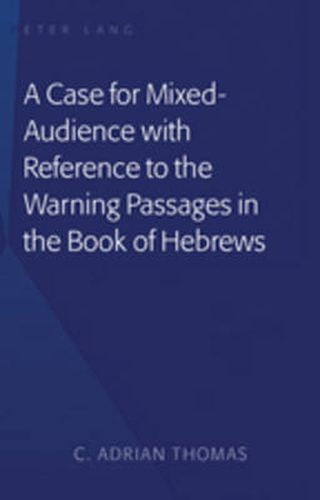Readings Newsletter
Become a Readings Member to make your shopping experience even easier.
Sign in or sign up for free!
You’re not far away from qualifying for FREE standard shipping within Australia
You’ve qualified for FREE standard shipping within Australia
The cart is loading…






This title is printed to order. This book may have been self-published. If so, we cannot guarantee the quality of the content. In the main most books will have gone through the editing process however some may not. We therefore suggest that you be aware of this before ordering this book. If in doubt check either the author or publisher’s details as we are unable to accept any returns unless they are faulty. Please contact us if you have any questions.
A Case for Mixed-Audience with Reference to the Warning Passages in the Book of Hebrews discusses the nature of the warnings in Hebrews and how these warnings relate to the theological question of the eternal security of believers. The main argument is that these warnings are intended to target a particular segment of the author’s community, about whose appropriation of and subsequent attitude toward the Christian message he was deeply concerned. That is to say, while the book of Hebrews is addressed as a message of encouragement to the community as a whole, its warnings are aimed at a certain element in the community whose salvation is threatened by a possible dangerous course of action. The book implies that while the author is persuaded that the majority in the community are genuine believers, there are some about whose salvation he doubts; hence the case for a mixed-audience . What is threatened, therefore, is not a salvation already possessed, but the salvation of those in danger of coming up short.
Theologically, the work falls within the sphere of the Calvinistic-Arminian debate regarding the assurance of salvation and the perseverance of the saints. It argues strongly for the Calvinistic position, but does so within the confines of the discipline of biblical studies, and lends extensive exegetical support to the Calvinistic position on the warning passages. The book is highly recommended for Bible College and seminary students and professors, as well as pastors and lay leaders who must give answers to their parishoners on those tough warning passages in Hebrews.
$9.00 standard shipping within Australia
FREE standard shipping within Australia for orders over $100.00
Express & International shipping calculated at checkout
This title is printed to order. This book may have been self-published. If so, we cannot guarantee the quality of the content. In the main most books will have gone through the editing process however some may not. We therefore suggest that you be aware of this before ordering this book. If in doubt check either the author or publisher’s details as we are unable to accept any returns unless they are faulty. Please contact us if you have any questions.
A Case for Mixed-Audience with Reference to the Warning Passages in the Book of Hebrews discusses the nature of the warnings in Hebrews and how these warnings relate to the theological question of the eternal security of believers. The main argument is that these warnings are intended to target a particular segment of the author’s community, about whose appropriation of and subsequent attitude toward the Christian message he was deeply concerned. That is to say, while the book of Hebrews is addressed as a message of encouragement to the community as a whole, its warnings are aimed at a certain element in the community whose salvation is threatened by a possible dangerous course of action. The book implies that while the author is persuaded that the majority in the community are genuine believers, there are some about whose salvation he doubts; hence the case for a mixed-audience . What is threatened, therefore, is not a salvation already possessed, but the salvation of those in danger of coming up short.
Theologically, the work falls within the sphere of the Calvinistic-Arminian debate regarding the assurance of salvation and the perseverance of the saints. It argues strongly for the Calvinistic position, but does so within the confines of the discipline of biblical studies, and lends extensive exegetical support to the Calvinistic position on the warning passages. The book is highly recommended for Bible College and seminary students and professors, as well as pastors and lay leaders who must give answers to their parishoners on those tough warning passages in Hebrews.